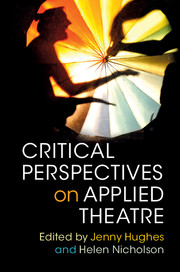Book contents
- Frontmatter
- Contents
- List of figures
- List of contributors
- 1 Applied theatre: ecology of practices
- PART I HISTORIES AND CULTURAL MEMORIES
- PART II PLACE, COMMUNITY AND ENVIRONMENT
- PART III POETICS AND PARTICIPATION
- 10 Applied theatre and participation in the ‘new’ South Africa: a possible politics
- 11 Staging Labour Rights
- 12 The micro-political and the socio-structural in applied theatre with homeless youth
- 13 A good day out: applied theatre, relationality and participation
- Notes
- Index
- References
10 - Applied theatre and participation in the ‘new’ South Africa: a possible politics
from PART III - POETICS AND PARTICIPATION
Published online by Cambridge University Press: 05 April 2016
- Frontmatter
- Contents
- List of figures
- List of contributors
- 1 Applied theatre: ecology of practices
- PART I HISTORIES AND CULTURAL MEMORIES
- PART II PLACE, COMMUNITY AND ENVIRONMENT
- PART III POETICS AND PARTICIPATION
- 10 Applied theatre and participation in the ‘new’ South Africa: a possible politics
- 11 Staging Labour Rights
- 12 The micro-political and the socio-structural in applied theatre with homeless youth
- 13 A good day out: applied theatre, relationality and participation
- Notes
- Index
- References
Summary
In the words of political scientist, Lawrence Hamilton, the majority of South Africans post-apartheid continue to live in a state of what he refers to as ‘unfreedom’ – they have acquired freedom in terms of the law but do not have the power to benefit from it (2011: 355). This chapter explores the extent to which participatory performance projects, particularly among those sectors of society that remain ‘unfree’ in South Africa today (and among the youth in particular), might intervene to counter perceptions of a ‘neo-liberal squeeze on democracy’ and the weakening of active citizenship in a context in which:
The dream of a people's democracy has been shrunk from the triad of strong representative, associational and participatory democracy to a form of weak representational democracy. (Satgar 2012: n.p.)
The chapter will engage with questions that arise from participatory theatre practices that work in alliance with more established and resourced organisations, and the possible politics they might give rise to in particular with regard to the notion of authority. In order to ground these ideas, the chapter will focus on two long-term participatory performance projects with marginalised youth conducted by Magnet Theatre, a company I founded together with Jennie Reznek in 1987, with strong links to the University of Cape Town (UCT) where I have taught since 1991.
The first project, the Clanwilliam Arts Project (2001–ongoing), based in the small town of Clanwilliam 300 km north of Cape Town, is an eight-day arts residency for rural school learners free for all who wish to participate on a voluntary basis. It is based on stories from the Bleek and Lloyd Collection, the most extensive and important archive of San (particularly /Xam) culture. These stories were narrated to linguist Wilhelm Bleek and his sister-in-law, Lucy Lloyd, in the mid-nineteenth century and transcribed in more than 13,000 notebooks now housed in the UCT library. Each year the project ‘frees’ one story from the archive and reinserts it into the landscape from which it originated. The project involves 500–700 school learners from the town each year and about forty facilitators are involved from various creative disciplines: lecturers and students from the UCT Drama, Music and Fine Art departments and trainees on the Magnet Theatre Training Programme under the direction of the Magnet Theatre creative team.
- Type
- Chapter
- Information
- Critical Perspectives on Applied Theatre , pp. 193 - 211Publisher: Cambridge University PressPrint publication year: 2016
References
- 6
- Cited by



